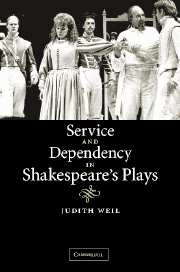4 - Friends and servants
Published online by Cambridge University Press: 22 September 2009
Summary
“Blessed are they that have been my friends.” Falstaff's hopes take the form of a beatitude when he learns from Pistol that Prince Hal will soon be crowned King Henry V (5.3.137–8). That any great man's rise buoyed up his followers would be axiomatic in early modern England. Access to power through subordination, so provocative when accomplished by Helena in All's Well That Ends Well, was a more predictable type of advancement for male servants who planned to become masters, or for followers who expected to lead. What concerns me in this chapter is not so much the operation of patronage, a subject of much recent study, as it is the fusion of service with friendship roles. How can Henry V break the heart of Falstaff by treating him like a servant who is to be dismissed with a pension or “competence of life” (5.5.66)? How can Antony break the heart of Enobarbus by behaving to him as a good lord and sending after this “master-leaver” his worldly goods? Answers to these questions which are based too narrowly on individual psychology miss, I believe, the significance of customary social dependencies in creating relationships of trust. By looking more carefully at how service intersects with friendship both ideologically and in more local, pragmatic terms, we may understand why characters like Enobarbus and Falstaff become particularly vulnerable to the great pains of lost service through the blessings they have experienced.
Information
- Type
- Chapter
- Information
- Service and Dependency in Shakespeare's Plays , pp. 80 - 104Publisher: Cambridge University PressPrint publication year: 2005
